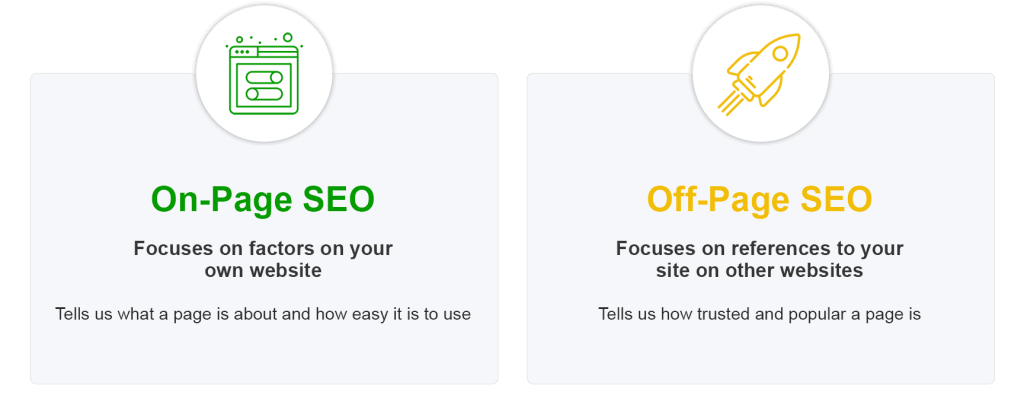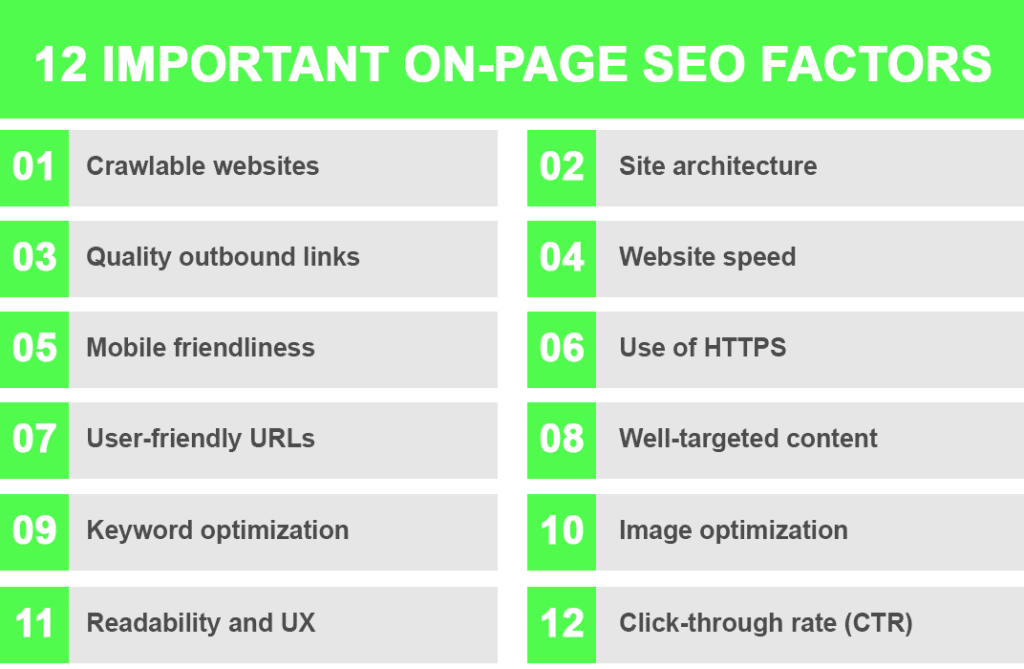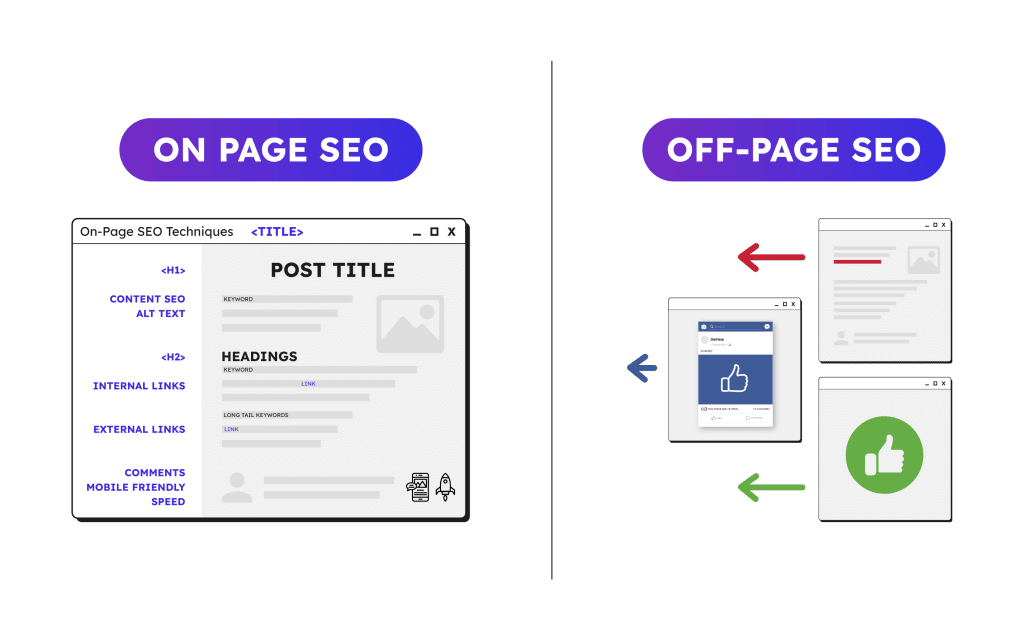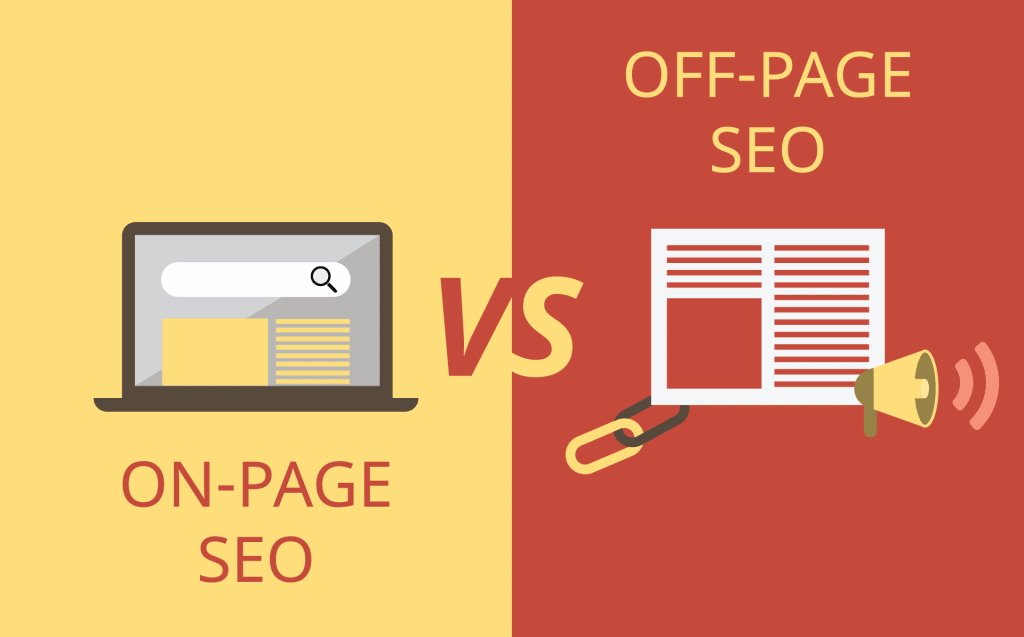If you’re new to the SEO world and are finding your way around the various strategies and techniques involved, it’s important to understand the difference between on-page and off-page SEO. You’ve probably come across these terms before and may even be familiar with a few of the tactics that fall under each category, but do you really know what sets them apart?
You’re about to find out! In this guide, we’ll explore the key differences between on-page and off-page SEO, as well as some of the most common tactics that fall under each category. By understanding these concepts, you’ll be better equipped to optimize your website for maximum visibility in search engines.
On-Page SEO vs. Off-Page SEO: The Definitions

On-page SEO refers to all of the strategies and techniques that you can use directly on your website to improve its visibility in search engines. This includes both technical optimizations, such as improving your site’s speed and structure, as well as content-related factors, such as the quality of your content and the keywords that you use.
Off-page SEO refers to all of the strategies and tactics that you can use outside of your website to improve its visibility in search engines. This includes things like building high-quality backlinks to your site, engaging with your audience on social media, and even optimizing your business listings for local search.
Generally, the distinguishing factor between on-page and off-page SEO is that the former focuses more on factors that are directly under your control, while the latter focuses more on influencing factors that are out of your control.
However, as both on-page and off-page SEO can significantly impact your site’s rankings in search engines, it’s essential to understand the strategies and techniques involved with both categories.
On-Page SEO Factors

As mentioned, on-page SEO focuses mainly on your website, ensuring that your site is properly optimized in all technical and content-related aspects. When most people refer to SEO, they’re generally talking about on-page SEO. Below are some of the most common on-page SEO factors that you need to be aware of:
Google’s Core Web Vitals
In recent years, Google has started to place more emphasis on user experience in its ranking algorithms. As such, they’ve introduced a set of metrics called Core Web Vitals that measure important dimensions such as visual stability (Cumulative Layout Shift), interactivity (First Input Delay), and load time (Largest Contentful Paint).
When these metrics indicate that your site has a positive user experience, Google will rank it higher in search results.
Page Speed
Page speed refers to the time it takes for your website to load in a browser, and research has shown that users are more likely to abandon websites that take longer than 3 seconds to load.
As such, Google tends to rank sites with fast load times higher in search results, so it’s important to ensure that your site is optimized for speed. Image optimization, code minification, and reducing the number of HTTP requests are all strategies that you can use to improve page speed.
Mobile-Friendliness
It’s estimated that nearly 60% of all search traffic comes from mobile devices, so if your website isn’t optimized for mobile browsing, there’s a good chance that you’re missing out on a large portion of your target audience.

Fortunately, Google has developed an algorithm specifically designed to identify and rank mobile-friendly websites, so optimizing your site for mobile is an important on-page SEO factor.
Content Structure
Title tags, meta descriptions, HTML headers, and image alt tags are some of the most important on-page SEO factors. These tags communicate vital information to both users and search engines, so they must be well-optimized.
Keyword usage, internal linking, and the inclusion of outbound links are other on-page content factors that can have a significant impact on your site’s rankings in search engines.
Navigation and Structure
To provide a positive user experience and make it easy for search engines to crawl and understand your site, you need to ensure that your website is well-structured for SEO.
This means using good navigation techniques, organizing content into logical silos, and including an XML sitemap. If Google has trouble crawling your site or understanding its structure, it’s likely that you won’t rank as well in search results.
Content Quality and Relevance
Search engine algorithms are designed to deliver the most relevant results based on keywords and other ranking factors, so creating high-quality, valuable content that serves the needs of your target audience is one of the best ways to improve your site’s rankings.
This can be done using various methods, including creating optimized content for your target keywords, incorporating infographics and other visual elements into your articles, and encouraging user engagement.
Off-Page SEO Factors

While on-page factors will have the greatest influence on your site’s rankings in search engines, it’s also important to consider off-page factors as well. These are the ranking signals that come from other websites, and here are a few of the most important ones:
Backlinks
The number and quality of backlinks pointing to your site have a significant impact on your rankings in search engines. For this reason, it’s important to build relationships with industry publications, guest post for other websites, and try to get your content cited by other blogs.
The reason backlinks have such a significant impact on your site’s rankings is that Google views them as a sign of trust and authority, so the more trusted links that you have pointing to your site, the higher it’ll rank in search results.
Social Media
Social media doesn’t directly influence your site’s rankings but can help you promote your content and reach new audiences. By promoting your content on these platforms, you can get more traffic back to your website and increase its ranking in search engines.
Not to mention, Google indexes pages on major social media platforms, so it’s important to consistently post your content on sites like Facebook, Twitter, and LinkedIn to control your brand SERP. A good social media strategy can also help you connect with your target audience and increase engagement, which can positively impact your site’s rankings.
Google My Business (GMB)
Google My Business (GMB) is one of the most important off-page SEO factors for local businesses, as it allows you to communicate relevant information about your business directly to Google. This includes location and service area information, details about your business type and contact information, opening hours, and other important data.
To take advantage of this powerful off-page SEO technique, make sure to set up your GMB listing as soon as possible and be sure to optimize it with your target keywords and other important information. Additionally, be sure to regularly check in on your Google My Business dashboard for any updates or changes that may impact how well you rank in search results.
Influencer Marketing
In addition to backlinks, social media, and GMB, another important off-page SEO factor is influencer marketing. This involves partnering with industry experts to promote your content and increase its visibility. This can be done by reaching out to influencers in your niche, partnering with bloggers and other publications, or using paid advertising methods like sponsored posts, display ads, or PPC.
Ultimately, the key to effective off-page SEO is to build relationships with other websites and influencers in your industry and create high-quality content that will resonate with your target audience. By doing this consistently over time, you can gradually improve your site’s rankings and visibility in search engines like Google.
Unlinked Mentions
Finally, unlinked mentions are another powerful off-page technique that can help improve your site’s rankings, where other sites mention your business or brand without linking back to you.
Unlinked mentions occur naturally due to high-quality content on your site, and they’re essentially “backlinks” from websites that don’t link to you. By tracking mentions of your business in this way and reaching out to people who have mentioned you but haven’t linked back, you can create valuable connections that may help improve your site’s ranking over time.
The Bottom Line: On-Page and Off-Page SEO Work Hand-in-Hand
While many often give weight to only one of these factors, it’s important to remember that on-page and off-page SEO are equally important for boosting your site’s visibility in search engines. One without the other will likely result in only limited success, so it’s essential to focus on both factors when developing your SEO strategy.
When you do this, you can begin to see improvements in your site’s rankings and overall online visibility. So don’t neglect either on-page or off-page SEO – focus on both for the best results! But if it seems like too much, you can count on our team at ShiftWeb Solutions to help you with your SEO strategy. Contact us today for more information!



